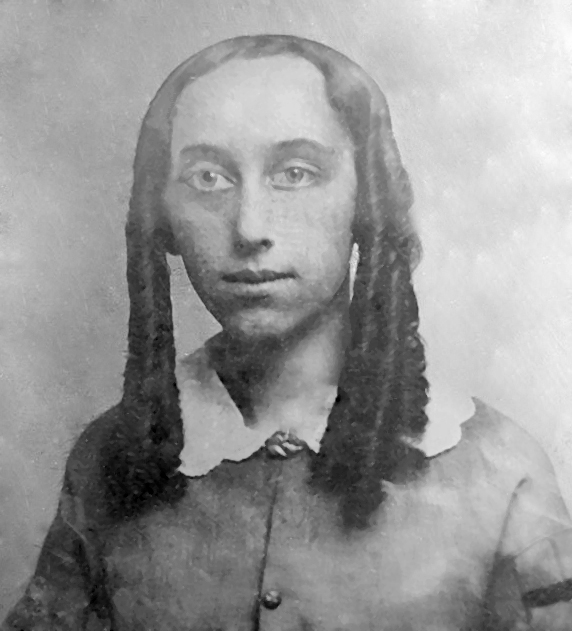“I know Lavinia can never earn a steady living.”
Maria Frost, April 10, 1865
It is doubtful that Lavinia Goodell ever enjoyed extended periods of good health. She was a sickly infant and youngster, and as an adult she was often ill. (During the years she practiced law, in addition to physical ailments, she suffered from frequent bouts of severe depression. That topic will be covered in a future post.) In spite of her many maladies, Lavinia rarely complained, and she never let her poor health stand in the way of accomplishing whatever she set out to do.

Although Lavinia did not waste time worrying about herself and maintained a hectic schedule until the final months of her life, her mother and sister spent an inordinate amount of time worrying about her and trying to dissuade her from being so active.
According to an unpublished biography written by Maria Frost after her sister’s death, Lavinia suffered from a great number of ailments as a child. Severe coughs and throat complaints. Bilious fevers that so deranged and prostrated her nervous system that she was scarcely able to bear her clothing. As Maria bluntly put it, “Physically, she was a wreck.” Lavinia was so frail that she was unable to attend school regularly. The silver lining in Lavinia’s poor health was that “to escape from gloom, it was the habit of her life to concentrate her mind on study. Books were her cities of refuge from the shades and duskiness of earth.”
When Lavinia began attending the Brooklyn Heights Seminary in the 1850s, her mother and sister again worried whether she was strong enough to endure the course of study. Travelling the five miles from the Goodells’ home to the school required Lavinia to take street cars and walk part of the way. This daily endeavor, according to Maria, “taxed her strength to the utmost.” When Lavinia graduated in 1859, Maria said her sister’s “health began to droop after the excitement of graduating was over” and “the question, what next, with its weighty responsibilities oppressed her.” Paradoxically, Lavinia’s own writings do not indicate that she was feeling “oppressed” at this time. Indeed, it was during this period that she first considered becoming a lawyer, much to her sister’s dismay.
In addition to worrying about Lavinia’s health, Maria also fretted over her sister’s ability to succeed in the world. In an undated letter written when Lavinia was about twenty, Maria wrote:
Oh! My poor child, sheltered as you are, how little you can know of this world, and how much is before you. I tremble when I think of it, and it is my prayer that you may be fitted for the emergencies of life that when the stern truths and realities are unveiled you will not droop & wilt under them as my weak nature sometimes has done and as most sensitive women do and must.

In 1865, after her father had retired from publishing the anti-slavery newspaper, the Principia, and her parents had moved to Lebanon, Connecticut to live with her aunt and uncle, Lavinia was in need of new employment. Her sister was very concerned about her prospects and was thinking of ways she could help her sibling out. And, in Maria’s opinion, the very best outcome would be if Lavinia would find a husband to provide for her. Maria Frost wrote to her mother:
I [don’t] see how Lavinia with her feeble constitution could ever earn a living…. If Vinnie could have a little income so as to buy her clothes I think I could get Lewis to let her live with me. I could see that she didn’t do too much better than anybody else, but I know she can never earn a living steady. That is if Vinnie hasn’t ever any gentleman friend to help her…. It is my nature to worry and be anxious.
Lavinia’s mother, too, frequently sent Lavinia advice on health-related matters, such as, “I must charge you to be very careful about taking cold or over doing by being out evenings or being over excited about anything. Be sure and get sleep enough.” And in the mid 1860s, when Lavinia reported that she had taken up the new activity of gymnastics, her mother tried to discourage it, saying, “I should think you had energies enough without it.”

Rather than complaining about her mother’s and sister’s good intentioned advice, Lavinia seemed to largely ignore them and do as she pleased. She continued to maintain a busy schedule until early 1880 when she went to Milwaukee to seek treatment for ovarian cancer at a Turkish bath establishment. She died in Milwaukee on March 31, 1880.
Sources consulted: Maria Frost’s letters to Clarissa Goodell (April 6, 1865; April 10, 1865); Maria Frost’s letter to Lavinia Goodell (undated but circa 1859); Clarissa Goodell’s letters to Lavinia Goodell (July 17, 1861; April 21, 1866); Maria Frost, Life of Lavinia Goodell, unpublished manuscript available at Berea College Special Collections & Archives, Berea, Kentucky; New York Times (September 28, 1865).







